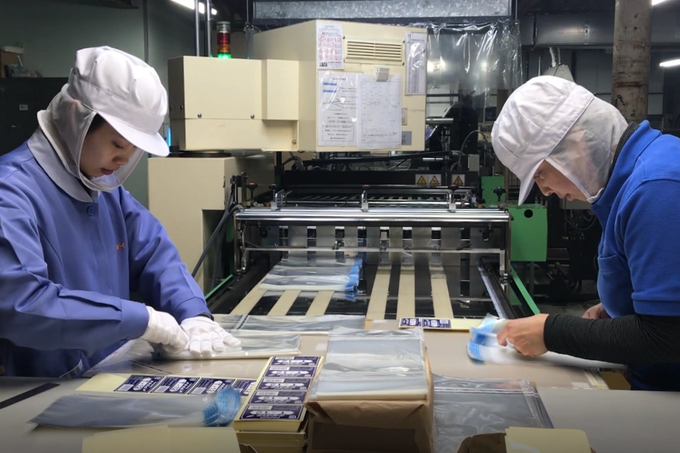When the Japanese currency fell
Coming to Japan to work as an export laborer since 2021, Mr. NTT (25 years old) is now preparing to submit an application to Australia.
"I know that compared to Japan, life, work and income in Australia are better. So having the opportunity to change jobs from Japan to Australia, for me, is the most ideal," T. confided.

Vietnamese workers in Japan have a large workload and high living cost pressure, especially at a time when the Yen is falling in value (Illustration photo).
Mr. T. said he is currently working as a food processor for a company in Japan with a salary of 30-45 million VND/month (including overtime).
It is estimated that after deducting living expenses, Mr. T. can send home about 10 million VND/month, but he has to save for a year to be able to send it back at once. Because banking procedures in this country are still quite complicated for workers with basic Japanese proficiency like Mr. T.
The above amount is the income before the currency fluctuations. Currently, due to the impact of the Japanese Yen devaluation, salaries and remittances back home will be more limited. On the contrary, the cost of living has not decreased, but even increased, causing the male worker to suffer a lot of financial pressure.
Previously, the family had to invest more than 100 million VND for Mr. T. to go to Japan to do his current job. According to Mr. T., other fields such as going to Japan to work as an engineer or studying abroad, the cost is even higher.
Even though he has been in Japan for nearly 2 years, Mr. T. still hasn't seen much profit from the money he has invested.

Many Vietnamese workers are aiming to go to Australia to work as students, apprentices or both tourists and workers (Illustration: GP).
Learning through many groups, Mr. T. decided to move to Australia to work when the situation in Japan was not very optimistic.
"Work pressure in Japan is quite intense. Workers, especially self-funded international students, sometimes only get a few hours of sleep a day because they have to both study and work, and their salary, in the context of the Yen's depreciation, is nothing.
I plan to get an IELTS English certificate, successfully apply for a visa, and then go to Australia in 2024. I chose Australia because its currency exchange rate is higher than Japan's. Above all, the main language in Australia is English, which is much more popular. Japanese is too difficult," said Mr. T.
Comparing the salary and living expenses between the two countries, Mr. T. thinks that working in Australia can be more comfortable. He plans to apply to study programming in Australia, with an income of about 80,000 AUD/year (about 1.2 billion VND).
During his apprenticeship, Mr. T. can also work part-time as a waiter or farmhand, with a salary of 700 AUD/week (about 11 million VND), higher than the salary of his main, full-time job in Japan.
"Weigh"... the work
Ms. D.TD (30 years old) also lived and worked in Japan for 6 years, and has just moved to Australia for nearly 1 year. Ms. D. believes that Vietnamese workers in Japan turning to Australia is a legitimate need.
"In fact, in groups and acquaintances currently working in Japan, many people have expressed their desire to move to Australia to work. Currently, the Japanese Yen is falling in value, so many people currently working in Japan have to calculate and change," said Ms. D.
According to Ms. D., the salary in Australia can be twice as high. Many jobs have a basic salary of about 23 AUD (about 358,000 VND), some places have up to 30-35 AUD/hour (472,000-550,000 VND), even 50 AUD (about 786,000 VND). Meanwhile, in Japan, jobs often have a basic salary of only about 1,000 Yen/hour (about 166,000 VND), some places have up to 1,500-2,000 Yen/hour (about 248,000-332,000 VND).
As for costs, according to female workers who have successfully changed jobs, many food items and the cost of living between the two countries are not too different in price.

The demand for Vietnamese workers in Japan to move to Australia to work is currently quite large (Illustration photo: NT).
"I always think I'm lucky to have such great experiences in Japan. But when it comes to living and working long-term, I'm not sure. In addition to income, life in Australia is closer to nature and more peaceful than the highly urbanized life in Japan," said Ms. D.
According to Mr. Duy Nam - Production Supervisor at a meat company in Australia, even people who have just arrived in Australia can earn tens of millions of VND per month. For skilled workers, income can increase to nearly 200 million VND.
The meat company where Mr. Nam works is recruiting workers under the 462 visa (work and holiday). Due to lack of experience, new workers will be assigned to lighter jobs than those with more experience. The salary, accordingly, depends on the workload of each person.
Specifically, the company will pay a minimum wage of about 500,000 VND (equivalent to 30 AUD) per hour, and a maximum of 930,000 VND (55 AUD). Here, workers will work 38-45 hours per week. Earning several million per day, hundreds of millions per month, according to Mr. Nam, is an achievable level.
According to the Memorandum of Understanding on supporting Vietnamese citizens to participate in the agricultural labor program in Australia, every year, the host country will receive about 1,000 Vietnamese workers to work in the agricultural sector with a basic salary (excluding living expenses) of 3,200-4,000 AUD/month (equivalent to 52.8-66 million VND/month).
Source link


































































































Comment (0)